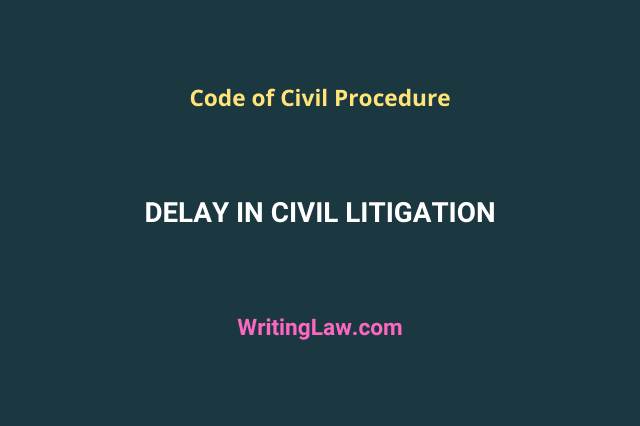
According to reports citing data from the National Judicial Data Grid and the Supreme Court, currently, 3.9 crore cases are pending in district and subordinate courts, 58.5 lakh cases are pending in various High Courts, and over 69000 cases are pending in the Indian Supreme Court.
This law note deals with delays in civil litigation, the dangers caused by it, the reasons for the delay, and the suggestions to improve this.
Dangers of Delay in Civil Litigation
The delay in resolving the case jeopardises the administration of justice. Time blurs the truth, weakens the witness’s memory, and makes presenting evidence difficult. This results in a loss of public trust in the judicial process, which is a threat to the Rule of Law and, as a result, democracy.
Rising litigation costs can also be attributed to delay, which causes litigants to either abandon the meritorious claim or settle for a lesser or unjust settlement out of court. To avoid anarchy, the aggrieved person must feel fairness, and it is the court that provides the systematic perspective.
Related: Impact of Pending Cases in Indian Courts
Causes of Delay in Civil Litigation
One of the most important requirements of justice is serving it as soon as possible. It’s well known that “Justice delayed is justice denied“.
Delay in litigation, on the other hand, is equally proverbial. And while it may appear self-contradictory, the fact remains that the very provisions of the Civil Procedure Code designed to facilitate the smooth and speedy trial of cases are misused and abused to delay cases indefinitely. As a result, cases pile up, creating a massive backlog in all courts.
The reason for the cause of delays in civil litigation are as follows:
1. Increase in litigation: A quick look at the numbers of cases filed in courts over the years reveals that litigation in the country has been increasing at an alarming rate. The courts are overburdened with cases, and while more courts are being built, the increase in number is insufficient to keep up with the increased number of cases.
2. There is a widespread belief that the government is failing to appoint a sufficient number of judges to keep up with the increasing workload.
3. Another reason for the delay is that the Civil Procedure Code’s provisions are not being properly observed and followed. For example, the process fee is not paid for a long time after the plaint has been filed. When provisions are used correctly, the dispute between the parties can often be narrowed before the parties go to trial.
4. The inefficiency of the governmental machinery has been responsible for or contributed to significant delays in the resolution of cases in which the government is a party.
5. The attitude of some lawyers is also partly to blame for the delay. When a plaintiff obtains interim or ad-interim relief, he is naturally interested in delaying the proceeding so that the stay or injunction can be extended as far as possible. Similarly, if the defendant has no defence, he is naturally interested in extending the trial to postpone the evil day for as long as possible.
Must Read: Restrictions on Advocates to Take Up Other Employment
Amendments in the Civil Procedure Code to Avoid Delay
It may be conceded that by the Amendment Act of 1976, extensive changes were made in the Code of Civil Procedure, 1908, all designed to avoid delay at every level. The necessary amendments were made in the provisions relating to:
- the appearance of parties,
- filing of the written statement,
- for the production of documents,
- issue of summons,
- framing of issues,
- examination of parties,
- summoning and enforcing the attendance of witnesses,
- adjournment, and
- pronouncement of judgement.
The amendments made in 1976 were not sufficient. In pursuance of the recommendations made by the Justice Malimath Committee, extensive changes have been made in 1999 and 2002 in the provisions relating to:
- issuance of summons,
- filing of the written statement,
- amendment of pleadings,
- production of documents,
- examination of witnesses,
- recording of evidence,
- grant of adjournment, and
- a new provision for settlement of dispute outside the court has been introduced.
Suggestions to Reduce Delay in Civil Litigation
The following suggestions are made to reduce delay in civil litigation:
1. There is one provision that, if used effectively by courts, can help to shorten the duration of the litigation. Order 10 Rule 2 of the Civil Procedure Code deals with the oral examination of the parties at the first hearing of the suit. This provision requires the court to examine the parties or resolve the issue as soon as possible. In practice, however, this position is simply ignored, and issues are invariably raised through the parties’ pleadings.
2. Despite the fact that the law commission recommended that a statutory notice under section 80 of the Civil Procedure Code be deleted, it has been retained.
3. On the other hand, certain provisions are not properly applied. Section 99 and section 99A of the Civil Procedure Code, for example, provide that no decree or order issued under section 47 of the Civil Procedure Code may be reversed or modified for error or irregularity that does not affect the merits of the case. Section 35A and section 35B of the Civil Procedure Code deal with compensatory costs for false or vexatious claims and for causing a delay.
4. Sometimes, the government files an appeal even though there is no substance in it or the point is covered by the judgement of the Supreme Court. They should avoid these.
5. In many cases, the court issues a notice to the government or public bodies at the admission stage to settle the case immediately if the point at issue is such that a regular hearing is unnecessary and the matter can be resolved quickly. Unfortunately, the government machinery is so slow to respond that no response to the notice is received.
6. The burden of cases on regular courts can be reduced by exploring the possibilities of setting up other forums where the dispute between the parties can be settled more informally and speedily.
7. Establishing more tribunals to handle disputes arising under various laws can reduce the burden on regular courts.
Read Next:
1. Best Novels for Law Students and Advocates
2. What Is Representative Suit as Per Civil Procedure Code
How was this law article?
- What Is a Foreign Judgement and When It’s Not Binding in India - 26th July 2022
- What Are Second Appeals Under Civil Law - 23rd June 2022
- Civil Appeal as Per the Civil Procedure Code - 12th June 2022










